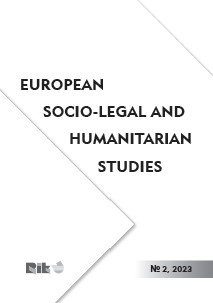ETHNIC CONFLICT IMPACT ON THE STATE DISINTEGRATION (YUGOSLAVIA CASE)
ETHNIC CONFLICT IMPACT ON THE STATE DISINTEGRATION (YUGOSLAVIA CASE)
Author(s): Tereziia Popovych, Mariana Topolnytska, Yuliia TelepSubject(s): Government/Political systems, Studies in violence and power, Nationalism Studies, Inter-Ethnic Relations, Peace and Conflict Studies
Published by: Editura U. T. Press
Keywords: legal system; armed conflict; impact of armed conflict; etnic conflict; concept of human rights;
Summary/Abstract: The aim of the work is to characterise the concept of «ethnic conflict» and to determine the influence spheres of this factor in the Yugoslav society in its transitional period. The methodological basis of the study is a system of methods, scientific approaches, techniques and principles that were aimed at achieving the study objectives. Universal, general scientific and special legal methods were used. The author conducted a study of the ethnic conflict, its characteristics and influence on the legal system in times of armed conflict. The article also talks about the types of subjects of ethnic conflict. In addition, the author carried out a description of the misconduct of participants in the ethnic conflict. An analysis of ethnic conflicts shows that they all have common features of development, which are manifested in the sequence of demands. In many cases, conflicts begin with issues of national language. It is precisely this sphere of conflict that goes from the latent phase to the open, because language is a characteristic feature of the identification of the nation. The author also researched that one of the causes of ethnic conflicts may be a different level in the economic development of the regions of a particular state. At the same time, another factor that led to the ethnic conflicts aggravation in Yugoslavia was the ideology of mutual assistance to underdeveloped republics to strengthen them and the creation of a fund for the republics development, that were not so developed and did not make the necessary contribution to the Yugoslav economy. The pursuit of an ethnic group dominant in an economically developed region can lead to an increase in nationalism. The extremely weak federal level of government, and the almost complete transfer of control over national decisions to the republics and autonomous regions, together with the right enshrined in the constitution to self-determination of their titular peoples, was the reason that this right was regarded as natural. That is why the author believes it is relevant to study ethnic conflict with a mixed population.
Journal: European Socio-Legal and Humanitarian Studies
- Issue Year: 2023
- Issue No: 2
- Page Range: 41-47
- Page Count: 7
- Language: English

